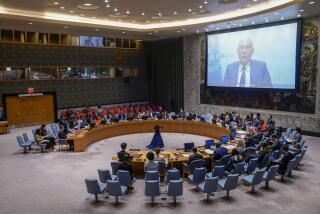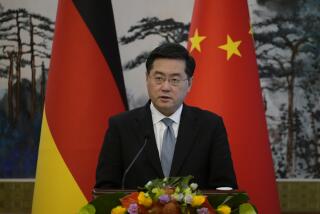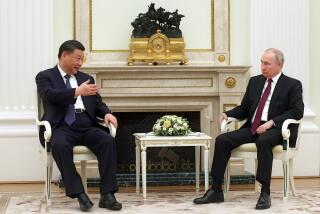China Balks at Sanctions but Warns N. Korea to Behave
BEIJING — China said Tuesday that a draft U.N. resolution to penalize North Korea for test-launching missiles would heighten tensions and set back efforts to resume talks on Pyongyang’s nuclear program.
But it also issued a rare warning to North Korea to watch what it does next.
“The Chinese side thinks the concerned draft is an overreaction. If approved, it will ... increase tension,” Foreign Ministry spokeswoman Jiang Yu said. “It will harm peace and stability in the Korean peninsula and Northeast Asian region and hurt efforts to resume six-party talks, as well as lead to the U.N. Security Council splitting.”
China, which shares a border with North Korea, has made no secret of its preference for negotiations over the economic sanctions resolution introduced by Japan.
But Tuesday, it also cautioned North Korea against acting rashly.
“We are against any actions that will aggravate the situation,” President Hu Jintao told Yang Hyong Sop, visiting vice president of North Korea’s parliament, the official New China News Agency reported. “We hope that relevant parties will do more things conducive to the peace and stability of the peninsula.”
U.S. negotiator Christopher Hill arrived in China on Tuesday, his second visit there in a week.
“China clearly has a close relationship with [North Korea] and the most influence, and we certainly would like to see what kind of leverage China has,” Hill said.
This morning, he said he stood by the draft resolution.
“We continue to be guided by the need to make a strong united statement to the North Koreans,” he said. “I think it’s a very good resolution.”
Hill spoke as he was leaving his hotel to meet with Chinese Foreign Minister Li Zhaoxing. He is not expected to meet with the North Koreans on this trip.
Analysts said the best outcome from the meetings would be an agreement that saw North Korea return to talks.
“That would alleviate the missile crisis,” said Jin Linbo, a researcher with the China Institute of International Studies in Beijing. “That said, we cannot expect too much. North Korea won’t totally give up.”
North Korea boycotted negotiations last fall and says it will not return unless the U.S. eases financial restrictions. The U.S. has said the measures are aimed at preventing money laundering and counterfeiting.
From the Chinese perspective, a resumption of six-party talks would also shift the focus from the United Nations, where China has been criticized for failing to support tougher sanctions, to Beijing, where it can cast itself as a hardworking host trying to find consensus in the interest of regional stability.
The talks aimed at halting Pyongyang’s nuclear weapons program involve the two Koreas, China, Japan, Russia and the United States.
Gu Bo in The Times’ Beijing Bureau contributed to this report.
More to Read
Sign up for Essential California
The most important California stories and recommendations in your inbox every morning.
You may occasionally receive promotional content from the Los Angeles Times.










